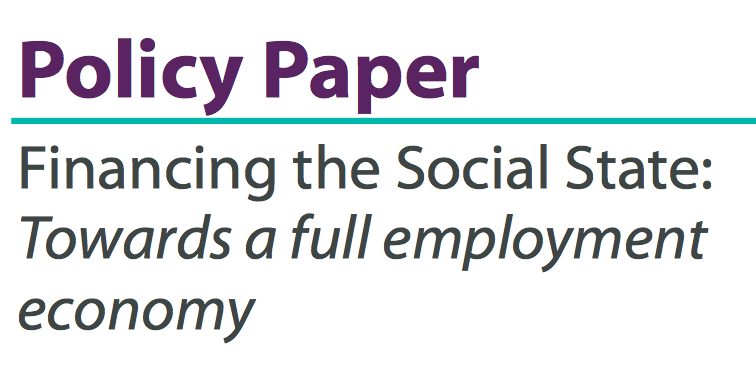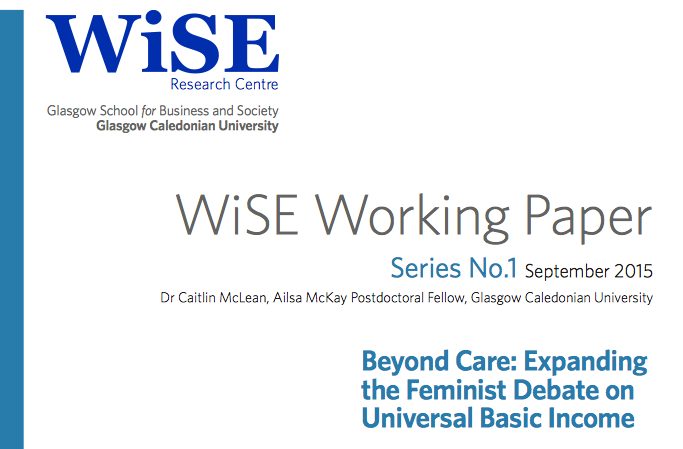
by Toru Yamamori | Nov 16, 2015 | Research

by Toru Yamamori | Nov 15, 2015 | Research
Richard Murphy and Howard Reed, ‘Financing the Social State: Towards a full employment economy‘ (pdf), the Centre for Labour and Social Studies, 2013.
Murphy and Reed recommend the implementation of an unconditional basic income in the U.K., in this policy paper. Murphy has been one of economic advisers for Jeremy Corbyn, the leader of Labour Party.

by Toru Yamamori | Nov 14, 2015 | Research
In this paper, Dr Caitlin McLean demonstrates ‘how a multi-dimensional perspective on gender equality strengthens the feminist case for BI proposals’.
The paper is the first of WiSE working paper series. The WiSE (Women in Scotland’s Economy) research centre was founded in 2010 by Professor Ailsa McKay, who had been vocal for feminist perspective on an unconditional basic income till her death in 2014.
Caitlin McLean, ‘Beyond Care: Expanding the Feminist Debate on Universal Basic Income‘(pdf), WiSE Working Paper Series No.1 September 2015, The Women in Scotland’s Economy (WiSE) Research Centre, Glasgow Caledonian University.

by Josh Martin | Oct 26, 2015 | News, Research
New research from economists at Hallym University in Chuncheon and Korea University in Seoul found that Alaska’s Permanent Fund Dividend has helped increase birth weights for Alaska newborns. According to the study, from 1978 to 1984, the dividend cash transfer increased weight by 34.8 grams (1.23 ounces) and reduces the likelihood of low birth weight by 14 percent when comparing to other states during the same period. Some Alaskan economists and pediatricians have raised doubts over the study, however, claiming that the study coincides with a time of big social and economic change in Alaska and thus the improvement must not be attributed solely to the Permanent Fund Dividend. Regardless, this study produces further arguments for the benefits of unconditional cash transfers like a basic income or the Permanent Fund Dividend.
For more background read the following link:
Yereth Rosen, “Does the PFD make babies bigger?”, Alaska Dispatch News, 10 October 2015.
The study itself can be found here:
Wankyo Chung, Hyungserk Ha, and Beomsoo Kim, “Money Transfer and Birth Weight: Evidence from the Alaska Permanent Fund Dividend”, Economic Inquiry, 23 June 2015.
by Karl Widerquist | Oct 13, 2015 | Research

David Casassas
Abstract:
Europe is experiencing rapidly accelerating poverty and social exclusion, following half a decade of financial crisis and austerity politics. The key problem behind Europe’s malaise, in our view, is the economic disenfranchisement of large parts of its population in the winner-takes-all-society. This article proposes that we examine the contribution of republican political theory as a distinctive approach that provides us with the conceptual and normative resources to reclaim what we call the political economy of democracy, the constellation of political and economic institutions aimed at promoting broad economic sovereignty and individuals’ capacities to govern their own lives. This article identifies three key ideas that together constitute a distinctively republican approach to political economy: (1) establish an economic floor; (2) impose an economic ceiling to counter excess economic inequality; and (3) democratize the governance and regulation of the main economic institutions.
David Casassas and Jurgen De Wispelaere “Republicanism and the political economy of democracy.” European Journal of Social Theory Volume 18, no. 4, 2015

Jurgen De Wispelaere
by Karl Widerquist | Oct 4, 2015 | Research
ABSTRACT: Namibia is still characterised by deep socio-economic inequalities, as economic structures have remained largely intact after independence. Poverty is still widespread and unemployment has remained high with women and youth being particularly affected. In 2002, the Namibian government’s Tax Commission proposed a universal cash grant as the most effective way to fight poverty and to reduce inequality. In 2004, the Basic Income Grant (BIG) Coalition was formed consisting of churches, trade unions and non-governmental organisations (NGOs) in support of the proposed grant. It implemented a pilot project to practically demonstrate the effects of the grant. The chosen location was the village of Otjivero where each inhabitant received a monthly cash grant of N$100 (US$9)beginning in January 2008. A research team closely monitored developments and found that within one year the rates of poverty, child malnutrition and school drop-outs had fallen significantly. Economic activities increased, school results and residents’ health status improved while the crime rate and women’s economic dependency on men were reduced. Despite these results, the Namibian government did not implement the BIG and the coalition failed to ignite a mass campaign. The country’s largest trade union federation did not play an active role and its leadership withdrew from the coalition despite support for the BIG among union members. The introduction of a BIG in Namibia will depend on the ability to the BIG coalition to create pressure ‘from below’. Trade unions and youth organisations in particular will have to mobilise their membership and present the demand for the BIG as a form of economic justice. In terms of financial and economic resources, Namibia could easily afford a national BIG and its introduction is a question of political will.
Herbert Jauch, “The Rise and Fall of the Basic Income Grant Campaign: Lessons from Namibia.” Global Labour Journal, Vol. 6, No. 3 (2015)

Global Labour Journal








